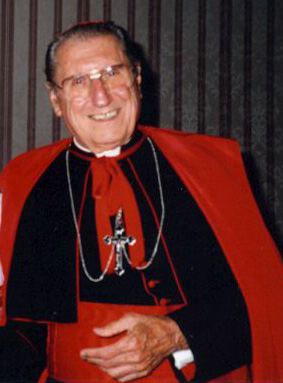John Cardinal O’Connor was installed as Archbishop of New York in March, 1984, and elevated to Cardinal in May, 1985.
He was born, the fourth of five children, in a row house in a blue-collar Philadelphia neighborhood on January 15, 1920. After ordination, he worked as a diocesan priest before joining the Navy. He served as a chaplain in both the Korean and Vietnam Wars. When he retired from the Navy after 27 years, he had risen to the rank of Rear Admiral and Chief of Chaplains of the Armed Forces. During his years in the Archdiocese of New York, Cardinal O’Connor ministered to both the rich and to the poor. He took his Irish heritage seriously and worked for peace in Northern Ireland. One of his proudest moments came in 1995 when he was Grand Marshal of the St. Patrick’s Day Parade in New York.
Were you conscious of your Irish roots growing up?
Oh my goodness yes. My father was the youngest of thirteen children. He was the only one born here in the United States. He was born shortly after the family moved here. You’d have thought that Parnell was his brother-in-law the way he talked about him. So I grew up Irish, as did so many kids in the old days in the great Irish cities.
I think that in my student years I was very conscious of my Irish heritage. I became immersed in the works of Patrick Pearse, Joseph Mary Plunkett, Padraic Colum, the Irish poets and essayists of the day. They gave me a certain intensity of feeling about the country. It’s pretty difficult to read something like Pearse’s poem “The Fool” without getting all stirred up about it.
What was it about your visit to Ireland that made you feel like becoming more active on the Irish question?
You use the word feel and I think it’s an appropriate word. I think in intellectual analysis and academic exercises and discussions don’t do quite the same thing, for no matter how many such discussions you engage in, if you don’t get the feel of injustice then I don’t think you will have the commitment to try and change the situation.
I was very disturbed in a session that we had with the Northern Ireland Development Board… I got the impression that the moment we began talking about discrimination against Catholics a chill entered the air and there was a pretense that such was not the case, or that it could all be rationalized, that it was a matter of geographical location or that it was a matter of the ghettos in which they lived. I think one of the bishops mentioned The MacBride Principles, and that seemed to cause a great eruption.
You know if my father had one passion above all else, it was one of justice towards the working man. He could tolerate no injustices, particularly on the part of big industry. He would tell story after story of the exploitations of workers, coal miners in Pennsylvania for example. He was a great union advocate. That’s in my blood, and when I sat with this group and they tried to tell me everything was fair and equitable – that there was no basic injustice – it had all been washed away – it just distressed me very much.


Leave a Reply